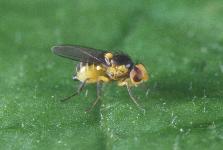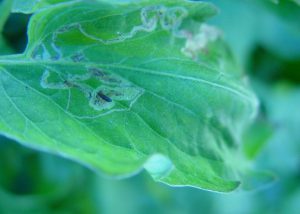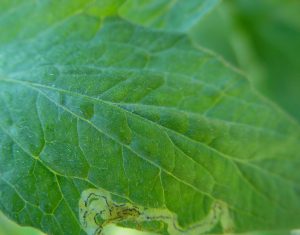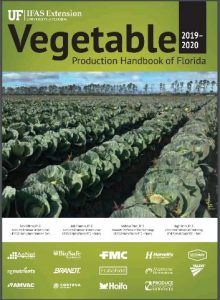Cool temperatures have finally arrived in North Florida! This is a perfect time to start planting cool season vegetables, such as broccoli, herbs, lettuce, turnips, or greens. Many cool season vegetables can be grown in the ground, raised beds, greenhouses, or hydroponic towers. However, these vegetables can be prone to various pests, affecting the crops. One pest that can cause damage to vegetable plants are leafminers. Read on to find out more about leafminers and the damage they can cause in your vegetables.
What are leafminers?

Leafminers are a common pest found in vegetable crops throughout Florida. Their live cycle is short and will complete in about 2-3 weeks. Adult females insert eggs into leaves just below the leaf surface. Leafminers will lay on average 30-40 oval shaped, small, white eggs per day. Larva will hatch and go through three active instars. The larvae will start colorless, go green, then yellow as it matures. Mature larvae will cut an exit hole in the leaf to exit the leafmine, drop, and burrow into the soil. After 9 days, the adult will emerge from the soil and begin mating.

Identification:
Adult leafminers are yellow and black flies about 1/8 inch in length, females are larger than males. Adults will live for about a month and during warm months will reproduce continuously. When scouting for leafminers in your crop, usually the first sign of infestation, will be leafmine damage. Looking closer, there may be larvae visible in the mine or poop evident in the mine. Finding these may be a good indicator there is a leafminer population within the crop.
Crop Damage:

When the larvae hatch, they will feed within the leaves, forming serpentine leafmines. Mine damage is random and will increase in width from 0.25mm to 1.5mm as the larvae matures. Leaf damage can reduce photosynthesis, cause premature leaf drop, and entry points can potentially introduce bacterial/fungal diseases into the plant. Make sure to scout your field to identify if leafminers are in your field.
Cultural Control:
- Start with clean transplants, free of eggs or larvae
- Monitor and control adults with yellow sticky traps
- Destroy or control weeds, since they can be host plants
- Clean-up field after harvest and destroy residue containing leafminers
- Deep plow crop residue so larvae cannot emerge from the soil

Chemical Controls:
Insecticides can help control leafminers since they are a common pest on vegetable crops, but insecticide resistance is possible. It is important to rotate modes of action. Check out the Vegetable Production Handbook of Florida for proper management practices. If insecticides are applied, remember to read the label, spray when the wind is low, and spray when there is a low pollinator population in the field. THE LABEL IS THE LAW. If you have concerns of leafminers, feel free to call me at the UF/IFAS Suwannee County Extension Office, an Equal Opportunity Institution, for spray recommendations at 386-362-2771.
 2
2
